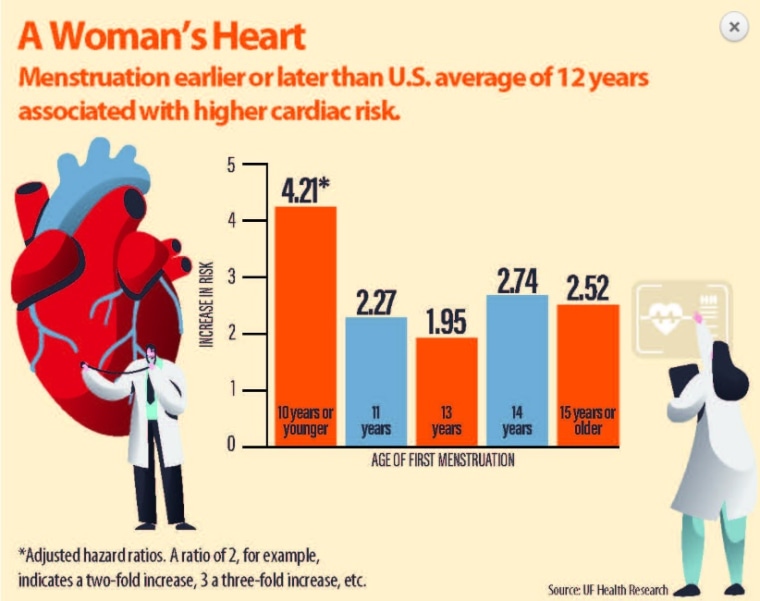The age when a woman first starts having her period may be much more significant than she or her doctor realize: it can impact her risk of heart attack, stroke and heart failure.
But most women aren’t aware of this risk factor, said Dr. Carl Pepine, a cardiologist and professor of medicine at the University of Florida in Gainesville.
“Not only are the women not aware of it, but their physicians aren’t aware of it. This is not recorded in most medical records — 90%,” Pepine told TODAY. “I just don’t think they were informed about it.”
He now routinely asks his female patients about the age of their first period and encourages the doctors he trains to do the same and pay attention to this item in a woman’s health history.
Pepine is the co-author of a study published in the Journal of the American Heart Association that found women who started menstruating even a year earlier or later than 12 — which is the average age of menarche, or the first period, for U.S. women — had a higher risk of “major adverse cardiac events.”
Girls who had their first period at 10 or younger had a four-fold higher risk of heart attack, stroke, heart failure and premature death down the road compared to girls who started menstruating at 12, researchers found.
Those who had their first period at 11, 13, 14 and 15 or older had at least a two-fold increased risk of such major cardiac events.

The results are based on data from 648 adult women who had symptoms of heart disease and who reported the age when they first started menstruating as part of research conducted by the National Heart Lung and Blood Institute. They were followed for six years to see what heart problems they developed.
Women who experienced earlier or later menarche “may differ in fundamental ways” from women who got their first period on time, the JAMA study authors noted, though they weren’t exactly sure how. Other studies have found similar results.
The theory used to be that the earlier a woman started menstruating, the longer her organs were exposed to estrogen over the course of her life. That does correlate with cancer risk, but it doesn’t correlate well with heart disease, Pepine said. Cardiac risk increased with early and late onset of menstruation.
One clue was the level of two inflammatory markers in women who had their first periods before or after age 12.
“They appeared to have very strong correlation with the adverse outcomes that these women experienced later on in life,” Pepine noted.
“There’s something in their body make-up that’s orchestrating this inflammation, and this inflammation is systemic, it involves their blood vessels and it’s associated with not very good things down the road.”
Advice to women:
There’s not much a girl can do to influence when she gets her first period, but the age may be an important part of her health history.
Any heart clues are vital: Heart disease is the leading cause of death for women in the U.S., but only 22% of primary care physicians and 42% of cardiologists feel well prepared to assess a woman’s cardiovascular disease risk, studies have found.
Women may experience different heart attack symptoms than men and they’re more likely to have coronary microvascular disease, which affects the heart's tiny arteries rather than the large ones.
Pepine offered this advice:
Tell your doctor if you started to menstruate earlier or later than 12, but don’t be surprised if your physician doesn’t know why that matters. If he or she doesn’t, point him to studies like the one covered in this article.
If you experienced a very early or late menarche, be especially vigilant if you experience any heart symptoms: they may include chest pain, chest discomfort and shortness of breath — a typical cluster of three symptoms in women who have reduced blood supply to the heart.
Consider taking preventative steps if you know you might be at higher risk for heart problems: monitor your blood pressure, eat a heart-healthy diet and exercise regularly. If your blood pressure is high, try lifestyle modifications to lower it.
Parents who notice their daughters either started menstruating before or after age 12 should tell their pediatricians: it may be important to start monitoring the girls' blood pressure and other heart factors.
